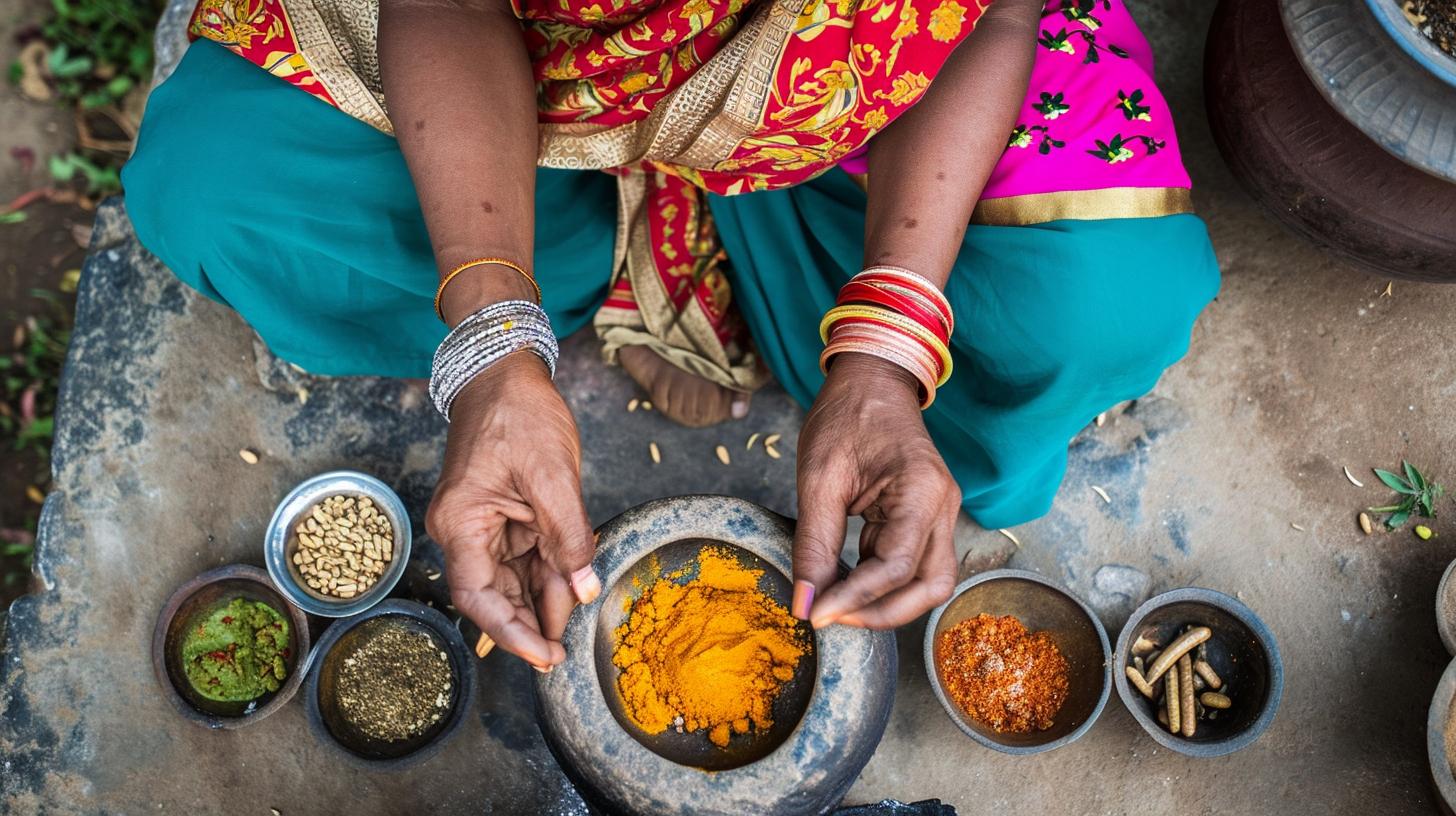
Ayurvedic medicine for women’s health has been practiced for centuries and focuses on holistic wellness by balancing the mind, body, and spirit. This ancient Indian healing system is based on the belief that a harmonious balance between these elements is essential for overall well-being. In Ayurveda, women’s health is approached with a deep understanding of the unique constitution and needs of women at different stages of life.
The practice of Ayurvedic medicine encompasses herbal remedies, dietary guidelines, lifestyle modifications, and holistic therapies to support optimal health. By addressing the root cause of imbalances rather than just treating symptoms, Ayurveda offers a natural approach to promoting women’s health.
In this article, we will explore the fundamentals of Ayurvedic medicine and its significance in promoting women’s health. We will also delve into common health concerns for women according to Ayurveda, along with specific treatments for menstrual health and hormonal imbalance.
Additionally, we will discuss the use of Ayurvedic herbs, supplements, and lifestyle recommendations to enhance emotional and mental well-being in women. Whether you are seeking natural remedies for gynecological issues or simply striving for holistic wellness, embracing Ayurvedic medicine can be a valuable journey towards optimal health for women.
Understanding Women’s Health in Ayurveda
Ayurveda, an ancient system of medicine that originated in India, provides a holistic approach to women’s health. Understanding women’s health in Ayurveda involves recognizing the unique constitution of each individual and addressing imbalances through personalized treatments. In Ayurveda, women’s health is viewed as a delicate balance of physical, mental, and emotional well-being that is influenced by the natural cycles of life.
Prakriti (Constitution)
In Ayurveda, the concept of Prakriti is fundamental to understanding women’s health. Prakriti refers to an individual’s unique physical and mental constitution, which is determined by the balance of the three doshas: Vata, Pitta, and Kapha. Each woman has her own combination of these doshas, which influences her overall health and susceptibility to imbalances. By identifying a woman’s Prakriti, Ayurvedic practitioners can tailor treatment plans specifically for her needs.
Women’s Health Cycles
Ayurveda acknowledges the importance of recognizing the natural cycles that women experience throughout their lives. These include menstruation, pregnancy, childbirth, and menopause. Each stage brings its own set of changes and challenges to a woman’s body and mind. Ayurvedic medicine for women’s health aims to support these cycles by promoting balance and harmony within the body.
Role of Agni (Digestive Fire)
According to Ayurveda, proper digestion is essential for overall well-being. In women’s health, maintaining a healthy digestive fire or Agni is crucial for supporting hormonal balance and energy levels. Imbalances in Agni can contribute to menstrual irregularities, hormonal issues, and emotional disturbances commonly experienced by women. Ayurvedic treatments focus on strengthening Agni through diet modifications and herbal remedies to address these concerns.
Common Health Concerns for Women in Ayurveda
Ayurvedic medicine for women’s health focuses on addressing a wide range of common health concerns that women often face. From menstrual health to hormonal imbalances, Ayurveda offers natural and holistic approaches to promote overall well-being. One of the key pillars of Ayurvedic medicine is the belief that each individual has a unique constitution, or dosha, which influences their physical, mental, and emotional characteristics. Understanding this concept is essential in addressing women’s health concerns using Ayurvedic principles.
Menstrual health is a significant focus in Ayurveda, as it plays a vital role in a woman’s overall well-being. According to Ayurvedic principles, any disruption in the menstrual cycle can lead to imbalances in the body and mind. Common menstrual health concerns addressed by Ayurvedic medicine include irregular periods, painful menstruation, and excessive bleeding. Ayurvedic treatments such as dietary modifications, herbal supplements, and lifestyle practices aim to restore balance and alleviate these issues without harmful side effects.
Another prevalent issue for women that Ayurveda addresses is hormonal imbalance. Hormonal fluctuations can lead to various symptoms such as mood swings, weight gain, fatigue, and irregular periods. In Ayurveda, targeting the root cause of hormonal imbalance involves identifying specific doshic imbalances and providing tailored treatments to restore harmony within the body. This may include specialized diet plans, rejuvenating therapies like Panchakarma, and the use of adaptogenic herbs to support hormone regulation.
Furthermore, Ayurvedic medicine emphasizes the use of natural herbs and supplements specifically beneficial for women’s health. These herbs are carefully selected based on their properties to address various health concerns such as improving reproductive health or supporting emotional well-being. For example, Shatavari is a renowned herb used in Ayurveda for its rejuvenating effects on the female reproductive system and hormonal balance.
| Common Women’s Health Concerns Addressed | Ayurvedic Treatment Approaches |
|---|---|
| Menstrual Health Issues (Irregular periods, painful menstruation) | Dietary modifications, herbal supplements |
| Hormonal Imbalance (Mood swings, irregular periods) | Tailored diet plans; rejuvenating therapies like Panchakarma; adaptogenic herbs |
Ayurvedic Treatments for Menstrual Health
In Ayurveda, menstrual health is considered to be a reflection of a woman’s overall well-being. The monthly cycle is seen as a vital cleansing process for the body and mind. Imbalance in this cycle can lead to various health issues, both physical and emotional. Ayurvedic medicine for women’s health focuses on restoring balance to the menstrual cycle through natural treatments and lifestyle modifications.
Understanding Menstrual Imbalances
According to Ayurveda, imbalances in the menstrual cycle are primarily caused by dosha disturbances. Vata, Pitta, and Kapha are the three doshas that govern all bodily functions, including menstruation. Irregular periods, painful menstruation, heavy bleeding, or absence of menstruation are all signs of dosha imbalances. Ayurvedic practitioners work to identify the specific dosha imbalance causing these issues before recommending any treatment.
Ayurvedic Treatments for Menstrual Health
Once the root cause of menstrual imbalances is identified, Ayurvedic treatments focus on restoring harmony to the doshas. This may include herbal remedies, dietary changes, stress-reducing practices such as yoga and meditation, and lifestyle modifications tailored to the individual’s unique constitution.
Herbs such as ashwagandha, shatavari, and triphala are commonly used in Ayurvedic medicine for women’s health to support healthy menstrual function. Additionally, therapies like Abhyanga (oil massage) and Panchakarma (detoxification) may be recommended to address underlying imbalances and promote overall well-being.
Ayurvedic medicine offers a holistic approach to menstrual health that aims to not only alleviate symptoms but also address the root cause of imbalances. By embracing these natural treatments and incorporating them into daily life, women can experience improved menstrual health and overall well-being.

By focusing on treating not just symptoms but underlying imbalances within the body, Ayurvedic medicine offers a comprehensive approach to women’s health that goes beyond conventional medical treatments.
Ayurvedic Approaches to Hormonal Imbalance
Hormonal imbalance is a common concern for many women, and Ayurvedic medicine offers holistic approaches to addressing this issue. According to Ayurveda, hormonal imbalance is often caused by an excess of the Pitta dosha, which governs metabolism and digestion. When Pitta is out of balance, it can lead to symptoms such as irregular menstruation, mood swings, and hot flashes.
One of the key principles of Ayurvedic treatment for hormonal imbalance is to address the root cause of the issue rather than just treating the symptoms. This may involve dietary changes, herbal remedies, and lifestyle modifications to restore balance to the doshas. For example, incorporating cooling foods like cucumbers and leafy greens into the diet can help pacify excess Pitta and reduce symptoms of hormonal imbalance.
In addition to dietary recommendations, Ayurvedic medicine also emphasizes stress reduction techniques such as yoga and meditation to support overall hormonal health. These practices can help lower cortisol levels and promote relaxation, which in turn can have a positive impact on hormone balance. By embracing these holistic approaches, women can find relief from hormonal imbalances and support their overall well-being.
| Ayurvedic Approaches to Hormonal Imbalance | Benefits |
|---|---|
| Dietary changes | Restores balance to the doshas |
| Stress reduction techniques | Promotes relaxation and hormone balance |
Ayurvedic Herbs and Supplements for Women’s Health
Ayurveda, an ancient holistic healing system, offers a variety of herbs and supplements specifically tailored to address women’s health concerns. These natural remedies have been used for centuries to support menstrual health, hormonal balance, emotional well-being, and overall vitality in women. In Ayurveda, the use of herbs and supplements is aimed at restoring balance within the body and promoting well-being from within.
One commonly used herb in Ayurvedic medicine for women’s health is Ashwagandha. This adaptogenic herb is known for its ability to help the body manage stress and promote hormonal balance. It is often recommended for women experiencing symptoms related to hormonal imbalance such as fatigue, anxiety, and irregular menstrual cycles. Another powerful herb is Shatavari, which has been traditionally used to support reproductive health in women. Shatavari is believed to nourish the female reproductive system and promote fertility.

In addition to these herbs, Ayurveda also emphasizes the use of specific supplements such as triphala, a blend of three fruits that supports digestive health and detoxification in the body. For women dealing with menstrual irregularities or digestive issues, triphala may be recommended as part of their holistic treatment plan. By incorporating these Ayurvedic herbs and supplements into their daily routine, women can take proactive steps towards nurturing their physical and emotional well-being through natural means.
Ayurvedic Practices for Emotional and Mental Well-Being
In Ayurveda, maintaining emotional and mental well-being is considered essential for overall health. The ancient practice places great emphasis on the mind-body connection and offers a variety of techniques to support emotional balance and mental clarity. Here are some Ayurvedic practices that women can incorporate into their daily routine to promote emotional and mental well-being:
- Meditation: One of the most widely recommended practices in Ayurveda for emotional and mental well-being is meditation. Meditation helps calm the mind, reduce stress, and enhance self-awareness. It can be especially beneficial for women dealing with anxiety, mood swings, or other emotional concerns.
- Yoga: Practicing yoga can help women release pent-up emotions, improve mental focus, and promote relaxation. Certain yoga poses are believed to have a direct impact on balancing emotions and calming the mind. Additionally, incorporating pranayama (breathing exercises) into a yoga practice can further support emotional balance.
- Ayurvedic Aromatherapy: Aromatherapy is often used in Ayurveda to influence emotions and promote mental well-being. Essential oils such as lavender, rose, jasmine, or sandalwood are used to create a calming atmosphere and uplift the mood. Women can use these essential oils in diffusers or as part of their self-care routine to support emotional balance.
By integrating these Ayurvedic practices into their daily lives, women can nurture their emotional and mental well-being while also experiencing the holistic benefits of ayurvedic medicine for women’s health. Embracing these timeless practices can help pave the way towards optimal wellness in all aspects of life.
Ayurvedic Lifestyle Recommendations for Women’s Health
When it comes to maintaining optimal health, Ayurveda offers a wide range of lifestyle recommendations specifically tailored for women. These holistic and natural approaches encompass various aspects of a woman’s life, including diet, exercise, self-care, and daily routines. By incorporating these practices into their lives, women can promote overall well-being and balance according to Ayurvedic principles.
Here are some Ayurvedic lifestyle recommendations for women’s health:
- Follow a regular daily routine – According to Ayurveda, establishing a consistent daily routine is essential for maintaining balance and harmony within the body. This includes waking up and going to bed at the same time each day, as well as scheduling meals and activities at consistent times.
- Practice self-massage (Abhyanga) – Self-massage with warm oil is highly recommended in Ayurveda for promoting skin health, relaxation, and overall well-being. It also helps in improving circulation and reducing stress.
- Engage in gentle exercise – Incorporating gentle exercises such as yoga or walking into your daily routine can help improve circulation, flexibility, and overall vitality. It is important to choose exercises that are suitable for your body type (dosha) to avoid imbalance.
In addition to these recommendations, Ayurveda also emphasizes the importance of following a proper diet that aligns with your unique constitution (dosha). By making conscious food choices and incorporating various herbs and spices known for their healing properties, women can support their reproductive health, hormonal balance, digestion, and overall vitality. Embracing these lifestyle recommendations can lead to comprehensive well-being by addressing physical, mental, emotional aspects of women’s health through the lens of Ayurvedic medicine.
Conclusion
In conclusion, Ayurvedic medicine offers a comprehensive and holistic approach to women’s health, encompassing both physical and emotional well-being. By incorporating ancient practices, herbal remedies, and lifestyle recommendations, Ayurveda aims to address the root cause of health concerns rather than just treating symptoms. This time-tested system of medicine recognizes the unique needs of women at different stages of life and provides natural solutions for common health issues.
From menstrual health to hormonal imbalances, Ayurvedic treatments offer gentle yet effective methods for addressing women’s specific health concerns. By focusing on balancing the doshas (Vata, Pitta, and Kapha), Ayurveda aims to restore harmony within the body, promoting overall wellness. Additionally, the use of ayurvedic herbs and supplements provides women with natural alternatives to support their health without the potential side effects of synthetic medications.
Moreover, Ayurvedic practices for emotional and mental well-being are invaluable for women’s overall health. Strategies such as meditation, yoga, and mindfulness are incorporated into Ayurvedic lifestyles to reduce stress, improve mental clarity, and promote emotional balance. It is clear that embracing Ayurvedic medicine can be empowering for women seeking a more natural and holistic approach to their health and well-being.






